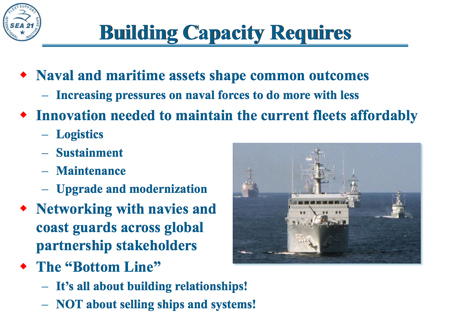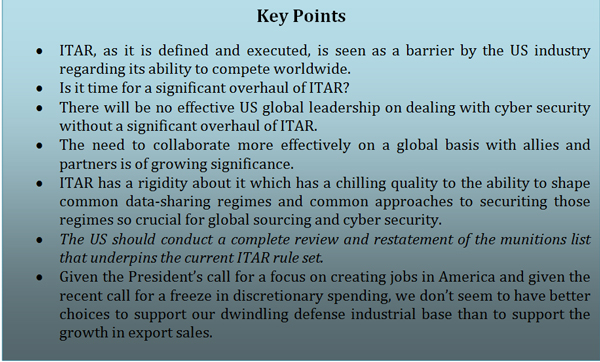Michael W. Wynne is the former Undersecretary for the Department of Defense, Acquisition, Technology and Logistics and the former Secretary of the Air Force.
***
“Time for a Dramatic Overhaul?”
“Jobs, Jobs, Jobs” is the current mantra of the Obama Administration. If we truly examine all aspects of job creation, exports, as a recent Washington Post column duly noted, provide a “clear route to recovery.” Historically, the largest component of exports has been the aerospace industry. If we would like to secure job creation for the future, we need to maintain this industry for the long-term.
The International Traffic in Arms Regulations (ITAR), with roots in preventing the proliferation of international weapons, has morphed over the decades into what appears to be a policy to keep America first to the rest of the world. Today, American manufacturers see it as an obstacle to their business and our international partners see it as an intrusion into their sovereignty.
Is it time for a dramatic overhaul? With the diminishing nature of our domestic defense producers, should the American policy be altered to maximize opportunity for international sales?
The inhibiting quality of ITAR will be put to the test as it tries to cope with a new phenomenon: cyber security. Cyber security will require greater global collaboration in both scope and nature. International players are currently acting on their own. Foreign governments are smartly putting disciplines into place to provide security protocols for their industrial and governmental concerns.
While, there are ever increasing calls for international cooperation and collaboration, these are countered by the enormous pressure to proceed alone as a country so that we can avoid the jurisdiction of the US ITAR rules. Many large and small software makers refuse to work solely with the US government. Instead, they would rather take their chances with the open market, secure some sales, and then offer their product to US agencies, thus avoiding ITAR labels.
Ushering Out Foreign Talent and International Cooperation
Though we retain enormous confidence in our present US-based capabilities, a surprising number of our most creative cyber experts are in fact first or second-generation immigrants. Unfortunately, some additional policy actions are beginning to restrict this source of talent.
Whereas in the recent past there were enormous opportunities for immigrants to stay in the United Sates and share in our prosperity, now opportunities are available in the furthest reaches of the world.
As a result of our experiences during the first decade of this century, we are ushering out foreign talent, even after they have achieved advanced science and engineering degrees. Study after study have demonstrated a structural loss of innovation and a concern that there may be insufficient indigenous American citizens trained in science and engineering. This training is necessary to design and develop weapons, both kinetic and non-kinetic.
There are attempts being made to counter this trend. For example, the National Defense Act of 2006 had a provision to sponsor science and engineering grants at the undergraduate and graduate level in return for service in the defense industrial complex.
More recently, in the emerging cyber security bills sponsored by Senator Rockefeller, a major section is dedicated to educating cyber professionals with scholarships and grants to build up the United States talent pool in this space. During a recent conference on the same topic, the immigration rules were excoriated to encourage reverse migration of the educated talent from our universities in an admission that this talent is heavily international.
Furthermore, the need to collaborate more effectively on a global basis with allies and partners is of growing significance. ITAR has a rigidity about it which has a chilling quality to the ability to shape common data-sharing regimes and common approaches to securiting those regimes so crucial for global sourcing and cyber security.

Clearly, there is a need for the distribution of knowledge and talent. For instance, early in the decade, the Chief of US Naval Operations called for a 1,000 ship Navy, which basically was a request for an international, interoperable fleet. The emergence of the Joint Strike Fighter will underpin a similar thrust in international interoperability by the USAF. Moreover, all of our engagements over the past several decades have been the fruit of international coalitions. In each case, no allied soldier, airman, or naval commander wants less combat capability from their joint or coalition partner. To fulfill these needs, the US should conduct a complete review and restatement of the munitions list that underpins the current ITAR rule set.
The Need to “Re-Boot” ITAR Rules
A new ITAR rule set should not have complete disclosure and release as the national character of our world demands some things remain closed. But given the current state of our industries, the current state of the technology space, and the current policy posture that we want to see and take with our international partners, the US needs to ‘re-boot’ the munitions list with an eye towards dramatic reduction.
Potentially, with all we now know or can learn from the internet, many of the old rules for dual use are outmoded. Even some of the rules for specific use are not actually single use, just first use. To start this process, we should give the industry partners the first edit rights and take their suggestions to heart. There will be tension, as the commercial objectives are to preserve or expand their markets. The government licensing function should retain its role, but the focus should be to expand markets rather than to assist in program capture.
In this way, the government will act to preserve this critical industrial base. It will be more active in truly creating the partnerships and collaborative enterprises that have been forecast in the world’s future. Given the President’s call for a focus on creating jobs here in America and given the recent call for a freeze in discretionary spending, we don’t seem to have better choices to support our dwindling defense industrial base than to support the growth in export sales. This decision will preserve and create high paying and stable US jobs. To solve the present dilemma of job creation, as well to preserve options for our future, action here makes sense.
***
———-
***Posted February 15th, 2010


